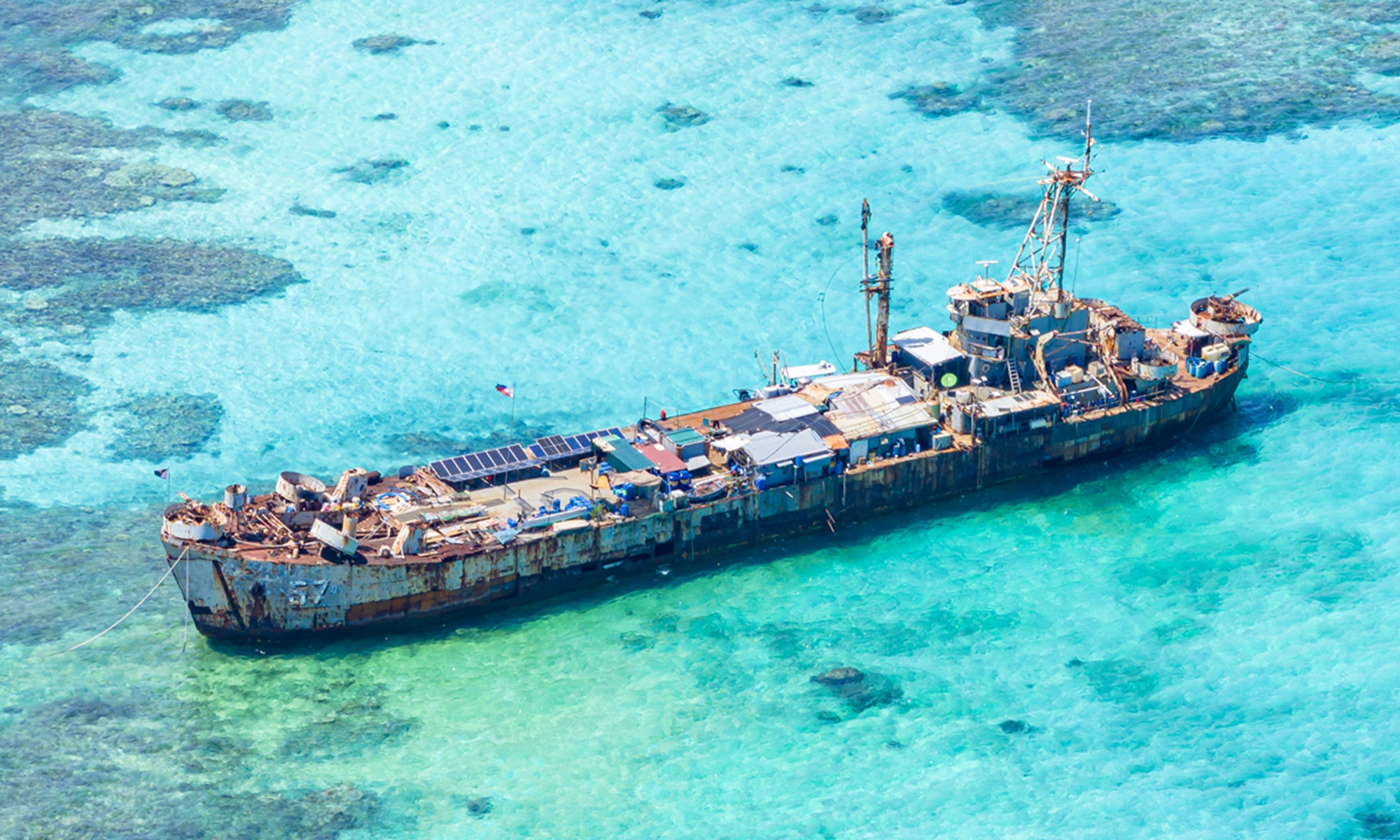Philippines completes resupply mission at Ren’ai Jiao under China Coast Guard’s supervision following deal with Beijing

The Philippine illegally grounded warship BRP Sierra Madre at Ren'ai Jiao Photo: Courtesy of South China Sea Ecological Center of China's Ministry of Natural Resources
On Saturday, the Philippines sent a civilian ship to deliver daily necessities to its warship grounded at Ren'ai Jiao in accordance with a temporary arrangement reached with China. The China Coast Guard (CCG) supervised the operation throughout, said Gan Yu, a spokesperson for the CCG.
China had been notified of the resupply before it was carried out, said a Chinese Foreign Ministry spokesperson on Saturday. After confirming on-the-scene that the Philippine vessel carried only humanitarian living necessities, the Chinese side let the Philippine vessel through, said the spokesperson.
According to the Chinese Foreign Ministry spokesperson, the arrangement was reached based on the three-point principled position of China on managing the situation at Ren’ai Jiao. China’s position on the Ren’ai Jiao issue has not changed. China has sovereignty over Ren’ai Jiao, the rest of Nansha Qundao (Nansha Islands) and their adjacent waters. China will continue to properly deal with relevant territorial issues and disputes over maritime rights with the Philippines through dialogue and consultation.
It is hoped that the Philippines will keep their promise, work together with China, and jointly manage the situation at sea, Gan said, noting that the CCG will continue to carry out law enforcement activities to safeguard rights in the South China Sea, including Ren'ai Jiao, also known as Ren'ai Reef.
China and the Philippines reached an understanding on managing the situation at Ren’ai Jiao, according to the Chinese Foreign Ministry on July 22.
This is mainly related to the principles and practices which the Philippines needs to abide by when providing essential supplies to the personnel on the warship illegally grounded at Ren'ai Jiao of China's Nansha Qundao for an extended period . It demonstrated that Beijing's comprehensive countermeasures against Manila's provocations in the region for more than a year are working in a sustained manner, resulting in the Philippines returning to direct negotiations and consultations, observers noted.
The signing of the new agreement can be seen as a litmus test, and so far it appears to be effective, Ding Duo, a deputy director of the Institute of Maritime Law and Policy at the China Institute for South China Sea Studies, told the Global Times on Saturday.
Chinese Foreign Minister Wang Yi met with Philippine Foreign Secretary Enrique Manalo in Vientiane, Laos on Friday and reaffirmed China’s position over Ren’ai Jiao, which is being viewed as playing a positive role in ensuring the successful implementation of the bilateral deal on Ren’ai Jiao.
When meeting with Manalo, Wang called on the Philippines to fulfill its commitments and refrain from changing its position as China has recently reached a temporary arrangement with the Southeast Asian country on the transportation and replenishment of humanitarian supplies to Ren'ai Jiao.
Commenting on the Philippines’ resupply mission to Ren’ai Jiao on Saturday, Ding said that moving forward, it will be important to see if the Philippines' willingness to manage differences can continue to translate into concrete actions.
Also, we should wait and see if external factors such as the US will influence the Philippines to deviate from their commitments, and if the Marcos administration can navigate domestic interference and distractions on this issue, according to Ding.
China's stance remains unchanged, and the country have a range of measures to address any negative actions by the Philippines, the expert noted.
Ding called on the Philippines to focus on managing differences, maintaining peace and stability in the South China Sea, and strengthening positive aspects of the China-Philippines relationship while minimizing negative factors.


